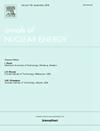钠冷快堆模型预测控制方法
IF 2.3
3区 工程技术
Q1 NUCLEAR SCIENCE & TECHNOLOGY
引用次数: 0
摘要
钠冷快堆(SFR)是具有固有安全性的第四代反应堆。由于其非耗散特性,频繁的换功率运行可能导致较大的功率振荡,需要更先进的控制方法来提高核电站的安全性和经济性。为此,提出了一种基于模型预测控制的SFR控制方法。建立了SFR的仿真模型并进行了验证。然后,将MPC方法应用于整体控制,并引入状态空间和二次规划形式的MPC模型进行系统约束下的优化。为验证其性能,分别对100% ~ 90% - 100%步进、50% ~ 60% - 50%步进、50%线性变化的负载瞬态进行了仿真,并与传统PID方法进行了比较。结果表明,在MPC控制系统的调节下,主要参数能够快速稳定地运行,无静态误差,超调量合理。本文章由计算机程序翻译,如有差异,请以英文原文为准。
A model predictive control method for sodium-cooled fast reactor
Sodium-cooled fast reactor (SFR) is the fourth generation reactor with inherent safety. Due to its non-dissipative characteristics, frequent power changing operation may lead to large power oscillations, which needs more advanced control methods to enhance safety and economic performance of nuclear power plants. Therefore, a Model Predictive Control (MPC) method for the SFR is proposed. The simulation model for the SFR is developed and validated. Then, the MPC method is applied to the overall control, and the MPC model in the form of state space and quadratic programming is introduced for the optimization under system constraints. To verify its performance, 100%–90 %–100 % step, 50 %–60 %–50 % step, and 50 % linear change of load transients are simulated, and compared with the traditional PID method. Results show that main parameters can quickly and stably operate without static error and with reasonable overshoot under the regulation of MPC control system.
求助全文
通过发布文献求助,成功后即可免费获取论文全文。
去求助
来源期刊

Annals of Nuclear Energy
工程技术-核科学技术
CiteScore
4.30
自引率
21.10%
发文量
632
审稿时长
7.3 months
期刊介绍:
Annals of Nuclear Energy provides an international medium for the communication of original research, ideas and developments in all areas of the field of nuclear energy science and technology. Its scope embraces nuclear fuel reserves, fuel cycles and cost, materials, processing, system and component technology (fission only), design and optimization, direct conversion of nuclear energy sources, environmental control, reactor physics, heat transfer and fluid dynamics, structural analysis, fuel management, future developments, nuclear fuel and safety, nuclear aerosol, neutron physics, computer technology (both software and hardware), risk assessment, radioactive waste disposal and reactor thermal hydraulics. Papers submitted to Annals need to demonstrate a clear link to nuclear power generation/nuclear engineering. Papers which deal with pure nuclear physics, pure health physics, imaging, or attenuation and shielding properties of concretes and various geological materials are not within the scope of the journal. Also, papers that deal with policy or economics are not within the scope of the journal.
 求助内容:
求助内容: 应助结果提醒方式:
应助结果提醒方式:


